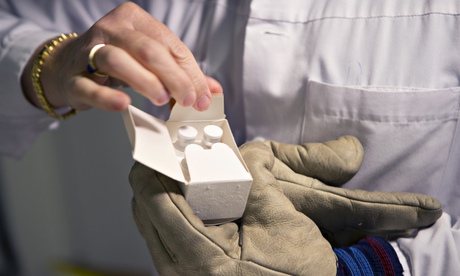
Scientists involved in trials of experimental drug treatments for the Ebola epidemic in west Africa should not be compelled to withhold them from some patients, says the World Health Organisation, despite objections from the US that it is the only way to be sure they work.
The Food and Drug Administration, which licences medicines in the US, believes the Ebola drug trials should be set up in west Africa on the “gold standard” model designed to provide a conclusive answer as to whether they have an effect. The FDA says the trials should be randomised and controlled – which means giving experimental drugs to one group of patients, selected at random, but not to others, so death rates and other outcomes in the two groups can be compared.
Other scientists, including those at the University of Oxford who are currently preparing for trials in the epidemic region, say that with a death rate of 70% and fear and suspicion of hospitals running high in the three worst affected countries in west Africa, it is not possible to run the sort of trial that would be standard in the UK or US. Instead, they are designing alternatives that will reach an answer but without depriving some patients of a drug that might possibly help them survive. The virus has claimed more than 4,800 lives since the outbreak began in December.
A meeting of the WHO’s ethics working group has supported that view, concluding that an alternative approach may be preferable in the very difficult circumstances of Sierra Leone, Liberia and Guinea.
“In the context of the current Ebola epidemic in west Africa – where the disease has a high fatality rate, and there are tensions between local communities, governments and healthcare workers – it may not be acceptable or feasible to conduct randomised placebo-controlled trials. Some members of the working group argued that in certain situations, it may also be unethical to do so,” say the formal minutes of the meeting.
A trial without a control group that fails to come up with a clear result to show whether a drug is helping or harming patients could also be considered unethical, the group acknowledged. But, it goes on, representatives at the ethics meeting from Guinea and Liberia, ”expressed their view that individually randomised placebo-controlled trials would not be acceptable to local communities because such trials would deny a new experimental treatment to some participants.”
Trudie Lang, professor of global health research at the University of Oxford and part of a team working to get drug trials started in west Africa with unprecedented speed using funding from the Wellcome Trust, said she did not believe the traditional gold-standard randomised controlled model was possible in the Ebola epidemic. “We have had health workers murdered. There is very fragile trust in the health systems,” she said. At the meeting, a doctor in charge of treatment centres said she would not put her staff at risk by denying drugs to some of the patients but not others. It could be particularly difficult if some members of a family were randomly selected to receive the experimental treatment while others were not.
Lang and colleagues are designing trials that will still come up with the answers – for instance by comparing survival rates now at a specific treatment centre with survival rates once all patients are given a certain drug. As there are several potential Ebola drugs being rushed into production, it may also be possible to compare one against another. “It is not a lower scientific standard – it is just a different scientific approach which is used in other settings, such as cancer trials. This design works when you are looking for a large change in outcome, so in Ebola, as in cancer, we are looking for a large increase in survival. In this situation it is appropriate not to randomise,” she said.
But the US regulatory body does not agree. Speaking at the American Society for Hygiene and Tropical Medicine meeting in New Orleans, Dr Edward Cox of the FDA said randomised controlled trials (RCTs) would be a “very informative” way to find out about the effect of the new drugs although there was “no question there are challenges in implementing such a design in a setting like west Africa”.
While he accepted that there was “a range of opinions” about the appropriateness of RCTs, he said that giving patients who did not get drugs the best possible standard of care, with fluids and blood transfusions, “can have a very positive impact on outcomes in patients with Ebola virus disease”.
“This will be challenging but it is very important to be able to understand what these products are doing,” he said. “If we can quickly figure out which products are helping patients, it will be possible then to move forward to scaling those products up and making them available to more patients.”
There are several drugs in the pipeline that scientists hope to trial in west Africa, all of them in early stages of development and some of which have not yet been tested in humans. Some are in pill form, while others would have to be given as injections or infusions and they work in a variety of ways. Most were designed to act against other viruses than Ebola. No announcement has yet been made as to which drug will be trialled first, but the hope is to get more than one going before the end of the year.
